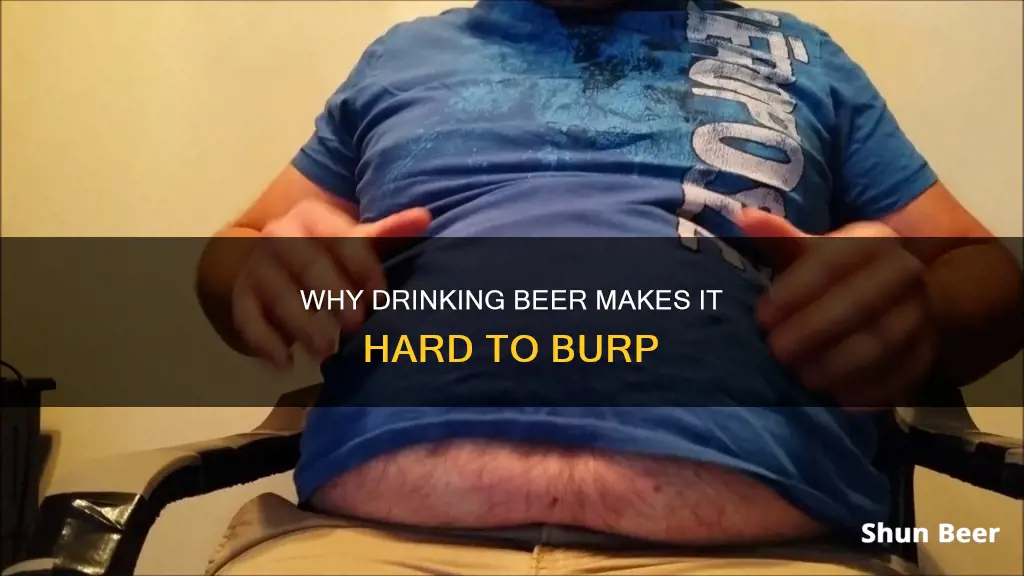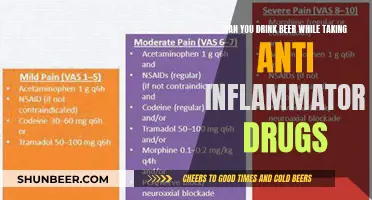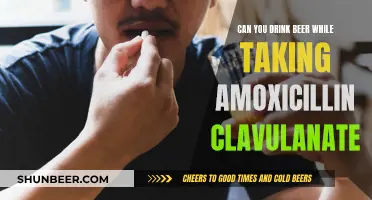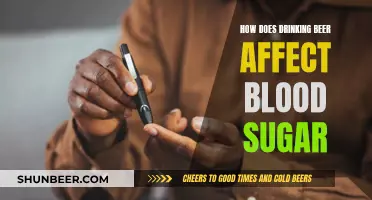
Many people experience difficulty burping after drinking beer, a phenomenon known as no-burp syndrome or beer bloat. This condition can cause discomfort, bloating, and even social anxiety. Sufferers of no-burp syndrome have a condition called retrograde cricopharyngeus dysfunction (R-CPD), where the cricopharyngeus muscle in the upper esophagus fails to relax and allow gas to escape. While there are treatments available, such as Botox injections, lifestyle changes, and home remedies, the condition can be frustrating and embarrassing for those affected.
| Characteristics | Values |
|---|---|
| Feelings | Fullness, discomfort, sickness, gurgling in the throat, abdominal pain, bloating, excessive flatulence |
| Actions | Unable to burp, vomiting, sticking fingers down the throat, lying down, drinking less beer, drinking bourbon or whiskey instead, drinking Guinness or other less carbonated beers |
| Causes | No-burp syndrome or retrograde cricopharyngeal dysfunction (R-CPD), a tight cricopharyngeus muscle |
| Treatment | Botox injections into the throat, muscle-relaxing medication, laser surgery |
What You'll Learn
- Sufferers of no-burp syndrome experience social anxiety and pain
- Carbonated drinks cause gas build-up in the stomach, triggering burps
- Movement can force air out of the stomach, causing a burp
- Retrograde cricopharyngeal dysfunction (R-CPD) is a cause of burping issues
- R-CPD is treated with muscle-relaxing medication or surgery

Sufferers of no-burp syndrome experience social anxiety and pain
Sufferers of no-burp syndrome, or retrograde cricopharyngeus dysfunction (R-CPD), experience a range of physical and social difficulties. The syndrome, only discovered in 2019, is caused by the cricopharyngeus muscle, which sits at the top of the oesophagus, failing to relax and allow air to exit the stomach and oesophagus. As a result, people with R-CPD are unable to burp, leading to a build-up of air in the stomach, oesophagus, and intestines. This causes a range of uncomfortable and often painful symptoms, including loud gurgling noises from the neck and chest, bloating, abdominal distension, and excessive flatulence.
The physical symptoms of R-CPD can be socially disruptive and provoke anxiety. Many people with the syndrome have been misdiagnosed with conditions such as acid reflux, irritable bowel syndrome, or small intestinal bacterial overgrowth, leading to unsuccessful treatments and a lack of relief. The condition can cause sufferers to feel anxious about social interactions, and some may even avoid social gatherings as a result.
The condition can be particularly challenging for those who enjoy drinking beer or carbonated beverages, as the gas in these drinks can exacerbate the symptoms of R-CPD. Some people with the syndrome have reported feeling extremely full and bloated after just a few drinks, and the inability to burp can lead to discomfort and even vomiting. While some individuals have found ways to manage their symptoms, such as by sticking a finger down their throat to induce gagging, the condition can still interfere with social activities and cause embarrassment.
Fortunately, there are treatments available for R-CPD that can provide significant relief. Botox injections into the cricopharyngeus muscle can help relax it and allow air to escape, and in most cases, the results are permanent. For those who do not respond to Botox injections, a minimally invasive surgical procedure called a partial cricopharyngeal myotomy may be an option. This procedure involves making a small cut in the cricopharyngeus muscle to allow it to relax and release air. With treatment, outcomes for people with R-CPD are typically very good, providing them with much-needed relief from the physical and social challenges of the syndrome.
Light Beer: Friend or Foe of Your Diet?
You may want to see also

Carbonated drinks cause gas build-up in the stomach, triggering burps
Carbonated drinks, such as beer, soda, and sparkling water, cause gas build-up in the stomach, which triggers burps. This is because these drinks are bubbly and gassy, and when consumed, the gas builds up in the stomach, creating pressure. This pressure then forces the air out of the body, resulting in a burp.
To increase the chances of triggering a burp, it is recommended to drink a large amount of the carbonated beverage quickly, as this will result in swallowing more air. Drinking through a straw can also increase the pressure. Additionally, movement can help put pressure on the air in the stomach and force it upward, potentially causing a burp. For example, if sitting, stand up, or vice versa. More vigorous movements, such as walking, jogging, jumping, or stretching, may also be needed to push the air out of the stomach.
However, for people with retrograde cricopharyngeus dysfunction (R-CPD) or "no-burp syndrome," carbonated drinks can cause discomfort. R-CPD is a condition where the cricopharyngeus muscle, which sits at the top of the food pipe or oesophagus, is unable to relax and allow gas to escape. This can lead to symptoms such as a pressure sensation in the upper neck and lower chest, gurgling sounds, chest pain, excessive bloating, and flatulence. Ingesting carbonated drinks can worsen these symptoms.
Some people who experience difficulty burping after drinking beer may have undiagnosed R-CPD. Treatment for this condition involves procedures to reduce the tightness of the cricopharyngeus muscle, such as Botox injections or surgical division with a laser. These treatments can help relax the muscle and restore the ability to burp.
Beer and Claritin: Safe Mix or Health Risk?
You may want to see also

Movement can force air out of the stomach, causing a burp
If you're struggling to burp after drinking beer, movement can be a great way to force air out of your stomach and bring about that much-needed relief.
When you're sitting, try standing up. If you're already standing, take a seat. This simple change in position can help shift air in your stomach and trigger a burp. You can also try lying down and then quickly standing up.
If that doesn't do the trick, more vigorous movement may be needed. Try walking, jogging, jumping up and down, or stretching. These actions can help put pressure on the air in your stomach and force it upward, potentially resulting in a burp.
If you're experiencing difficulty burping after drinking beer, you may be dealing with retrograde cricopharyngeus dysfunction (R-CPD) or "no-burp syndrome." This condition affects the cricopharyngeus muscle, which sits at the top of the food pipe or oesophagus. Normally, this muscle relaxes briefly when we swallow, allowing food and drink to pass through, and also when we burp to let air out. However, for people with R-CPD, the cricopharyngeus muscle doesn't relax for burping, leading to a buildup of gas and uncomfortable symptoms.
If you suspect you may have R-CPD, it's recommended to consult an ENT surgeon or a specialist like laryngologist Dr. Michael Pitman, who leads one of the primary treatment centres for this condition. Treatment options include Botox injections or surgery to relax the cricopharyngeus muscle and restore your ability to burp.
Understanding the Basics of Draft Beer Systems
You may want to see also

Retrograde cricopharyngeal dysfunction (R-CPD) is a cause of burping issues
Retrograde cricopharyngeal dysfunction (R-CPD), also known as "no-burp syndrome", is a rare condition that affects the cricopharyngeus muscle, preventing people from burping or belching. This muscle, located at the top of the oesophagus, typically relaxes to let food and drink pass into the oesophagus and, when enough air builds up in the stomach, it relaxes again to let the air escape through the mouth or nose, resulting in a burp. However, for those with R-CPD, the cricopharyngeus muscle does not relax to release excess air, leading to a buildup of gas in the stomach, oesophagus and intestines.
The condition was only discovered in 2019, and there is still much that is unknown about it. It is believed to be a lifelong condition, though some people with R-CPD have learned to burp. It can affect both children and adults, and there is no approved diagnostic test. However, Botox injections are a common treatment, as the botulinum toxin can relax the cricopharyngeus muscle, allowing air to escape. This treatment is low-risk and effective, and often provides long-term relief from symptoms.
The main symptom of R-CPD is being unable to burp, but other symptoms include loud gurgling noises from the neck and chest, abdominal pain and discomfort, a feeling of fullness or pain in the throat or chest, and an inability to vomit. These symptoms can cause social anxiety and embarrassment, leading to people with R-CPD avoiding social gatherings.
Drinking Beer During Lunch Break: Is It Okay?
You may want to see also

R-CPD is treated with muscle-relaxing medication or surgery
Retrograde Cricopharyngeal Dysfunction (R-CPD) is a medical condition that causes an inability to burp or belch. It was first identified by Dr Robert Bastian of the Bastian Voice Institute in Chicago. R-CPD is caused by a problem with the cricopharyngeus (CP) muscle, also known as the upper oesophageal sphincter (UES). The CP muscle sits at the top of the food pipe or oesophagus and remains closed to protect the throat from the contents of the stomach and oesophagus. When we eat and drink, the CP muscle relaxes to allow food to pass into the oesophagus, and when we burp, pressure in the upper oesophagus causes the CP muscle to relax to release built-up gas.
R-CPD is characterised by four main symptoms: the inability to belch, abdominal bloating, gurgling noises from the chest, and excessive flatulence. Many sufferers also experience abdominal distension, with some reporting that they look "six months pregnant" by the end of the day. The underlying cause of R-CPD is unknown, but it appears to be related to the CP muscle's inability to relax in response to oesophageal pressure. This dysfunction causes a build-up of gas that cannot be released through burping, leading to discomfort and bloating.
The standard treatment for R-CPD involves injecting muscle-relaxing medication, such as botulinum toxin (Botox), into the CP muscle. This treatment aims to weaken or paralyse the muscle temporarily, allowing it to relax and release built-up gas. The procedure is often performed under general anaesthesia and typically results in a mild sore throat. The effects of Botox usually last for about three months, and most patients report an improvement in symptoms and the ability to burp within a few weeks of the procedure. However, it's important to note that a small percentage of patients may experience temporary difficulty swallowing after the injection.
In some cases, an alternative treatment option is considered if the Botox injection is unsuccessful. This involves a surgical procedure called partial cricopharyngeal myotomy, which involves cutting the CP muscle to reduce its tightness and help it relax during burping. This surgery is typically performed under general anaesthesia and may be recommended for patients who do not respond adequately to the Botox injections.
Drinking Beer on Texas Streets: What's Legal?
You may want to see also
Frequently asked questions
You may have retrograde cricopharyngeal dysfunction (R-CPD), or "no-burp syndrome". This condition is caused by the cricopharyngeus muscle in the upper oesophagus being unable to relax and allow gas to escape.
If you have R-CPD, you will likely experience the following symptoms:
- Inability to burp or belch
- Pressure sensation in the upper neck and lower chest
- Loud gurgling sounds
- Chest pain and/or discomfort in the stomach region
- Excessive bloating in the abdomen/belly
- Excess production of flatulence or gas
- Difficulty vomiting
R-CPD can be treated with Botox injections into the cricopharyngeus muscle to help it relax. This treatment is permanent for most patients, with only about 20% needing a second shot.







